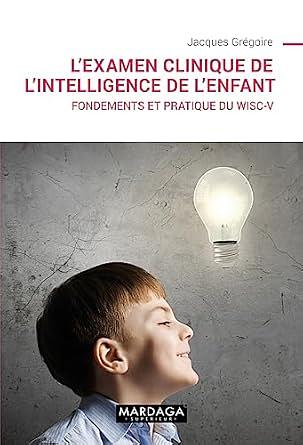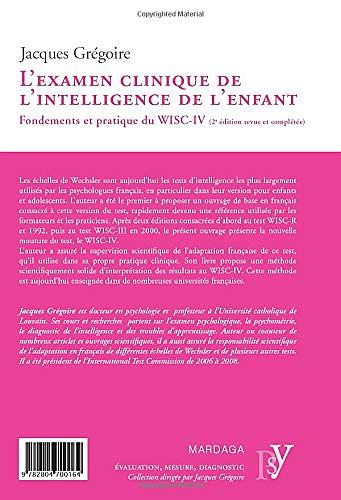The Clinical Examination of Child Intelligence: Foundations and Practice of the Wisc-V
A new edition of The Clinical Examination of Child Intelligence , a book that brings together several measuring instruments necessary for determining a child’s intelligence quotient.
The Wechsler Intelligence Scale for Children (WISC) is today the most widely used intelligence test by French-speaking psychologists. Professor Jacques Grégoire was the first to offer a basic work in French devoted to this test, which quickly became a reference used by trainers and practitioners. Today, he offers us a work on the new version of this test, called WISC-V. A member of the American scientific committee that supervised the development of the WISC-V, he also collaborated on its French adaptation, which he uses in his own clinical practice.
This book presents a rigorous method for interpreting WISC-V results, which is based on an in-depth knowledge of the theoretical bases and metric properties of the scores obtained on the test. It will allow practitioner readers to fully assume their role as interpreters of the results and to draw maximum relevant and useful information from the WISC-V protocols.
Intended for professionals in the world of psychology, this book will guide you in interpreting the results of intelligence assessment tools.
EXTRACT
Wechsler’s conception of intelligence and its measurement is not very different from Binet’s. For Wechsler (1944, p. 3), “intelligence is the complex or global capacity of an individual to act in accordance with a goal, to think rationally and to have effective relationships with his environment”. He conceives of intelligence as resulting from the organization of a set of aptitudes and not as a particular aptitude. Wechsler thus avoids reifying intelligence and making it a directly observable psychological or cerebral entity. On the contrary, intelligence is, according to him, an emergent quality that characterizes the behavior of an individual in his relationships with his environment. Intelligent behaviors result from the quality of the capacities engaged, but also from the way in which these capacities are coordinated. Intelligent behavior can be compared to the performance of a symphony. The quality of this performance depends on the quality of each musician, but also on the direction of the orchestra. The symphony is not a property of each individual musician. It only exists because of the interaction of musicians. In the same way, the fact that an individual has certain abilities that are well above average does not necessarily imply that he or she has an overall intelligence of the same level. The savant syndrome is a good example of this phenomenon. These are subjects whose IQ is generally very low and whose learning and adaptation capacities to their environment are limited, but who have an exceptional aptitude in a very specific area (Treffert, 2014).
ABOUT THE AUTHOR
Jacques Grégoire is a doctor of psychology and a professor at the Catholic University of Louvain. His courses and research focus on psychological examination, psychometrics, and the diagnosis of intelligence and learning disorders. He has over thirty years of clinical experience in the diagnostic examination of children and adolescents and their therapeutic management.
Only 1 left in stock
Description
Publisher � : Mardaga; 3rd edition (20 Feb. 2019) Language � : French Paperback � : 320 pages ISBN-10 � : 280470565X ISBN-13 � : 978-2804705657









Reviews
There are no reviews yet.